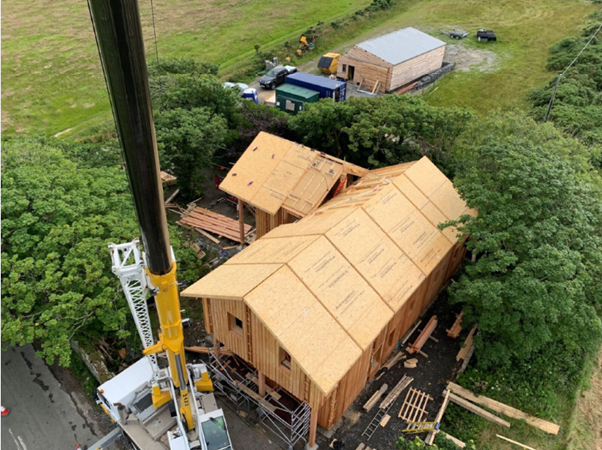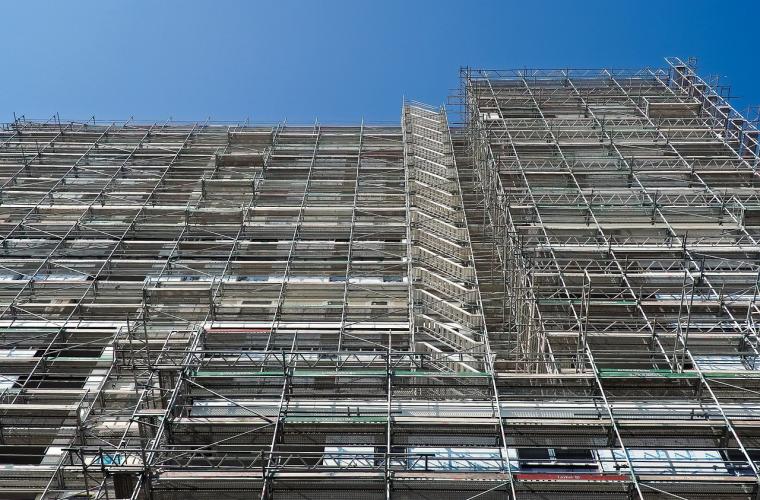The main political parties have now announced their manifesto promises ahead of the General Election on July 4.
Even though they have all made reference to aspects of the wider construction industry – from affordable housebuilding to the inevitable planning reform – the response has been consistently lukewarm.
In each case, part of each party’s manifesto has found favour. But the overall reaction has been a concern about what is missing from the proposed policies.

We take a look at the key manifesto reactions:
Conservatives
RIBA President Muyiwa Oki said: “This manifesto contains some welcome commitments such as prioritising brownfield development, supporting community housing schemes, and delivering homes for older people, but it lacks a clear strategy to upgrade our shamefully energy inefficient housing stock.
“While appreciating the need for a more efficient planning system, it fails to mention the lack of adequate expert resource – critical to delivering high-quality, sustainable homes in places people want to live.
“These are steps in the right direction, but more needs to be done to address our housing and climate crises.”
Richard Beresford, Chief Executive of the National Federation of Builders (NFB), said: “A healthy construction industry is the only way a nation can grow and unfortunately, construction has taken some great hits in these last five years. The Conservative manifesto announced tax cuts that will benefit our sector, particularly as almost fifty percent are self-employed; however, without pipelines of work, construction will not be able to avail from tax changes.
“It is therefore frustrating that the Conservative manifesto intends to plough ahead with the recent changes to planning and housing policy which have caused new build completion to drop considerably. We therefore have to question how 1.6million homes can be delivered, when previous more housing positive policy environments only delivered 835,680 homes over the previous five years.”
Brian Berry, Chief Executive of the FMB, commented: “Britain is currently experiencing a housing crisis, and today’s Conservative Party manifesto launch was an opportunity to set out a plan to deliver real change over the next five-years. The pledge to support smaller local builders, by requiring councils to set land aside for them, will be welcomed by FMB members, as will proposals to lift Section 106 requirements for smaller sites. However, if the housing crisis is to be successfully tackled reform of the planning system is urgently needed, something the Conservative Party has consistently failed to address.
“The plan to build 1.6 million homes over the next five years, delivered through increased building on urban brownfield land, is positive, however it will remain insufficient to tackle the scale of the crisis the UK faces. The next government will need to go much further in delivering the homes that Britain needs. Earlier this year the FMB launched its own manifesto, Growth from the ground up, setting out a positive plan to boost the construction industry. The Conservative Manifesto was a missed opportunity to announce that they would launch a dedicated Housing Department in Whitehall, with a Secretary of State attending Cabinet, to ensure delivery is prioritised.
“The construction sector is a key pillar of the UK economy, and a thriving construction industry is essential to delivering sustainable long-term economic growth. The next government will also need to tackle the ongoing construction skills crisis; support the rollout of energy efficiency upgrades to existing homes; introduce a scheme to set a minimum competency level for builders; and provide wider business support to SME construction firms facing a difficult economic climate. Delivering on these areas will be vital in delivering a brighter future for our country.”
The UKGBC said: “General Elections are all about the opportunity for fresh starts and while the Conservative’s electoral tagline promises much, it fails to deliver on the detailed framework for how we move towards a better future for Britain.
“The manifesto doesn’t go anywhere far enough on addressing the linked climate, nature and cost-of-living crises we are facing.
“We still need a ‘Clear Plan’ to rapidly decarbonise the country, and upgrade people’s homes and town centres. We need to see the ‘Bold Action’ to address the millions of damp, dangerous and expensive-to-run properties, and protect our communities from climate risks. Instead of inspiring and galvanising us to action, these Conservative commitments add uncertainty and risk, rather than promising a ‘Secure Future’.
“In his speech Rishi Sunak again counterposed affordability with action on climate – promising to “put your wallets ahead of eco-zealotry”. Given the health, wellbeing and economic cost of inaction on climate and nature vastly out-ways the cost of action, the task for all parties is to put forward bold new ideas to make action affordable and attractive. We haven’t seen that in this manifesto.”
Green Party
RIBA President Muyiwa Oki said: “Commitments to provide 150,000 new social homes, invest in upgrading leaky and draughty housing and develop green skills are most welcome.
“It’s also good to see extra funding pledged for local authorities, which could be extremely effective to deliver high-quality, sustainable communities if planning departments get a piece of the pie.
“Proposals to calculate whole-life carbon echo our own calls, but they must be embedded in building regulations.
“This manifesto sets out some positive proposals, but they need fine-tuning to properly address problems faced by the built environment.”
The UKGBC said: “It’s good to see the Greens position ‘fairer, greener homes’ right at the top of their manifesto as central to tackling both the climate and cost-of-living crises. They have understood the scale of long-term investment needed with £29 billion this parliament as part of an ambitious 10 year programme to retrofit homes.
“So far, this election hasn’t been a ‘climate election’ despite the dire warnings from scientists. This manifesto, is a useful contribution to driving the issue up the agenda given the next government will be the last capable of bringing in the game-changing policies needed.
“The Greens have put “fairer, greener homes” at the centre of their manifesto, and have responded to the UK having the worst insulated homes in Europe with a comprehensive green retrofitting programme.”
Richard Beresford, Chief Executive of the National Federation of Builders
(NFB), said: “Previous Green Party manifestos have felt unachievable, but their
2024 offering curbs their climate and social ambitions to put forward a
document that cuts across all political parties. They have also taken a serious
view on the retrofit challenge, which should be welcomed.
“There are some costing which do not appear correct and some ideas that are
contradictory, but they have made some insightful suggestions, which the NFB
has previously lobbied for, and therefore should be considered by every
political party.”
Labour
RIBA President Muyiwa Oki said: “Labour’s ambitions to deliver high-quality, sustainable homes are encouraging – as are pledges to fund additional planning officers – to bolster the broken system that presents a barrier to delivery.
“Further mechanisms to boost our housing supply must also be welcomed, not least proposed updates to the National Planning Policy Framework, a brownfield-first approach, and the release of low-quality ‘grey belt’ land for development.
“The manifesto offers overarching solutions, but lacks critical detail on delivering social housing and futureproofing existing homes. How will the Party deliver the next generation of council houses? Where’s the comprehensive National Retrofit Strategy to cut people’s bills and reach net zero?”
Richard Beresford, Chief Executive of the National Federation of Builders (NFB), said: “Labour have accepted the blindingly obvious; that growth requires bold action. And one of those bold actions must be to fix the planning process, not just for housing but energy, public services, employers, transport and many other strategic ambitions that have been ignored over these past two decades.
“Thankfully, this appears a core component of the Labour manifesto and if they win the general election, and more importantly implement their promised reforms, the UK can look forward to more homes and jobs, better infrastructure and transport, stronger placemaking, certainty for investors and levelling up in practice, rather than as a slogan. In turn, this wealth creation will mean higher tax revenues and more money available for public services.
“The UK needs a plan for growth and Labour appear committed to implementing one.”
Brian Berry, Chief Executive of the FMB, commented: “The current housing crisis won’t be solved unless radical proposals to reform the planning system are put in place. The Labour Party Manifesto contains several exciting proposals, which offer hope for the future of the building industry. The plans to build 1.5 million new homes over the next five years, and the pledge to impose binding house building targets on local councils, are welcome news. Labour’s ‘Grey Belt’ proposals, which sit alongside their Golden Rules for development, offer real hope for seeing small sites for new homes unlocked.
“Planning reform is a key issue which the FMB has long campaigned for. Earlier this year the FMB launched its own Manifesto, Growth from the ground up, which called on the UK’s political parties to ensure that the National Planning Policy Framework is enforced at the local level, and to see additional funding for local authority planning officers. It is encouraging that the Labour Party have taken these calls on board.
“Proposals to establish ‘Skills England’ offer hope to tackle the current skills crisis in the building industry. Pledges to boost apprenticeship numbers as well as Labour’s Warm Home Plan will be a major boost to rolling out retrofitting of homes across Britain. There is, however, potential to go further with the creation a dedicated Housing Department and a Secretary of State for Housing who can attend Cabinet meetings.”
Gillian Charlesworth, CEO BRE, said: "Keir Starmer has set out the Labour’s Party plan to rebuild Britain. The pledges around clean energy, housing and infrastructure should offer hope to the many sectors who will be responsible for driving the transition to net zero.
"Labour’s industrial strategy promises to place data-led insights at the centre of future decision-making, by supporting the development of the AI sector and establishing a National Data Library to consolidate existing research programmes. This strategy, coupled with new powers to ensure the construction of scientific laboratories, data centres and new net zero infrastructure, should go a long way towards incentivising the innovation required to accelerate the clean heat transition.
"This could be transformative for the decarbonisation of the built environment. By spurring crucial investment in AI and data, the UK will be better equipped to deliver an improved planning system and retrofit programme for our homes and buildings. Data-driven insights will be crucial if governments – both national and local – are to successfully partner with industry and consumers to hit our net zero commitments in the years to come.
"The Labour Party’s manifesto sets out an ambitious, multi-faceted plan to grow and decarbonise the UK economy. Whatever the result of the election, maintaining a laser focus on our climate goals, including when it comes to the built environment, should be an economic imperative for the forthcoming Government."
The UKGBC said: “There’s a lot to welcome here for the green built environment sector – from upgrading cold damp homes and giving renters new rights, to ensuring new developments are sustainable with increased climate resilience and promoting nature recovery. But although Labour has pledged to double investment in home upgrades, our analysis shows this won’t be enough.
“Labour has listened to our sector and has committed to increase funding for local authority planning after a collapse in the number of planning officers in recent years. These aren’t huge sums of money but would transform capacity to develop local plans and attract wider investment.”
Liberal Democrats
RIBA President Muyiwa Oki said: “From delivering 150,000 social homes to mandating a zero-carbon standard for new builds, to introducing a Home Energy Upgrade retrofitting programme to adequately resourcing planning departments, there is much to welcome in this manifesto.
“As a country, we’re crying out for high-quality social housing and for a plan to upgrade our leaky housing stock.
“While welcoming these proposals, I urge the party to consider mandating both operational and embodied energy as part of their new zero-carbon standard, and to consider using stamp duty as a retrofit tax incentive – something we’ve long been calling for.
“These are ambitious, encouraging pledges, but they won’t succeed without the expertise of architects and collaboration across our sector.”
Richard Beresford, Chief Executive of the National Federation of Builders, said: “When it comes to skills, placemaking and supporting net zero, the Liberal Democracy ambition sits well with NFB asks; however, without a timeline for their ambitions and some contradictory positions, for example, to build 380,000 new homes a year but loading on greater planning insecurity and higher build costs, there are some serious questions to ask about its deliverability.”
The Home Builders Federation has written to the leader of the Liberal Democrats to highlight inaccuracies about the house building industry in their election manifesto and request that revisions are made.
In the letter addressed to Sir Ed Davey, HBF expresses its disappointment in reading the party’s assertion that “newly built homes are often energy inefficient and environmentally unfriendly” and outlines the evidence on why it should be dismissed.
Government data shows that almost 9 in 10 new builds achieve an A or B energy rating, whilst fewer than 5% of older properties achieve the same performance. Additionally, new homes emit 61% less carbon than older properties on average.
The increased energy performance of new homes means they are powered by 57% less energy, therefore saving the average homeowner £140 a month of running costs.
The letter details the industry’s commitment to supporting national environmental targets, evidenced in part by the creation of the Future Homes Task Force and Future Homes Hub, and the progress already made in improving the thermal and energy performance of new builds.
HBF also rebuts the Lib Dems’ claims that “too many new houses are built as leasehold”, sharing the latest government data which shows that more than 99% of all new houses are sold as freehold.
Whilst acknowledging the unfounded criticism of the industry may ‘play well politically’, HBF calls on the party to publish a revised version of the manifesto to ensure voters are well-informed and avoid letting down those ‘at the sharp end of the housing crisis.
In addition to directly answering the manifesto’s inaccuracies, HBF concludes by taking the opportunity to increase awareness of the benefits of development, including supporting around 750,000 jobs and generating £40billion in economic activity each year.
The UKGBC said: “The Lib Dems have understood people are looking to politicians to tackle the housing and health crises. We welcome the ‘emergency Home Energy Upgrade programme’ and renter’s rights for millions in cold, mouldy homes they can’t afford to heat.
“Ensuring new homes have public services, green spaces and are protected from climate risks like flooding are all sensible proposals. What we haven’t seen is a commitment to fight for the scale of public investment needed to make this happen. Anything less than £64 billion over 10 years, for home upgrades alone, is unrealistic.
“It’s striking that the Lib Dems have put tackling the housing crisis front and centre of their ‘Fair Deal’ offer to the country, alongside a big focus on health and the environment.”
Reform Party
Richard Beresford, Chief Executive of the National Federation of Builders (NFB), said: “Reform have clearly reshaped a political debate and a contract with the voters is an innovative approach. As Reform are accepting comment, we urge them to look at the NFB’s industry shaped manifesto which will help them understand how business would like be efficient and lean.
“The UK is desperate for a better debate about policy in practice and we will be testing Reform’s commitment to this with our won submission to their manifesto.”
The UKGBC said: “Reform say 'scrap net zero to cut bills' but this would keep us hooked on sky-high gas prices and the Party offers no hope to the millions stuck in cold damp homes in desperate need of insulation- which is most sure-fire method to bring down bills.
"The proposal to scrap plans to end no-fault evictions will feel like a kick in the teeth to many renters who fear asking landlords to bring their homes up to basic standards.
“Scrapping climate action isn't a cost saver.
“It would pull the rug out from communities and businesses across the country for whom this is their best hope for an injection of investment to revive their hollowed out high streets, public buildings and public spaces and to protect them from the misery of flooding.”




















